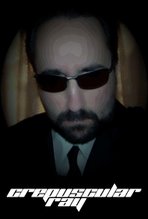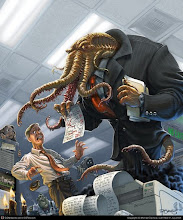Although it's nice to have a little slice of Americana in my living room, it took me less than a week to grow tired of the offered programming. This is largely because most popular American TV shows these days are heavily-serialized, and comprehension can only be achieved by seasons of dedicated viewership. I can watch and enjoy an old episode of Columbo, but when Alias comes on I just sit in a confused stupor, trying to follow along with the story but mostly waiting for Jennifer Garner's next outfit change.
This annoying plot-grasping hindrance could, conceivably, be alleviated by the wonders of broadband internet (which, coincidentally, has been recently installed in my own abode) and peer-to-peer file-sharing technology. If someone in Japan--or anywhere else in the wired world--wanted to, they could download almost any imaginable television episode on their computer's hard drive and play it back whenever convenient. Doing this would allow the American home viewer abroad to both play renegade station manager and feel close-to-home on days when home is sorely missed.
Since such an activity would likely violate numerous international copyright laws, I would never do it nor dream of suggesting this activity to someone else. But it's nice to know that I could, conceivably, watch any television show aired in America whenever I desired, in the privacy of my Japanese living room, across the stunning breadth of my massive high-def flat-screen computer monitor, and sonically aided by my majestic 5.1 stereo surround sound system. If only I weren't a man of such high moral fiber...
But I digress. Let us change subjects from the possibility of securing pirated television data streams to the current state of American television. I have, through unspecified but assuredly legal means, managed to get completely caught up on the new seasons of Lost, South Park, and Sopranos. Additionally, I've begun watching 24 from its inaugural first season, and I've also been watching HBO's new family-oriented drama, Big Love.
I have some thoughts:
Lost should be renamed Isle MacGuffin or Island of Implausibly Baffling Human Behavior (I don't care what you think--the latter title is quite catchy). This show itself is pretty much about convincing home viewers to watch commercials. Oh yeah, and something about some people who survived a plane crash in the south Pacific. In all seriousness, Lost has a few fine actors (notice I said "a few") and beautiful Hawaiian scenery that courageously struggle to survive insipid and moronic script-writing. Each segment tidily stirs tension to a climax right before a commercial break, and the overall achieved effect (even without having to watch commercials) is that the show becomes stiflingly formulaic. Why do I watch? Because I can gleefully ridicule the retarded parade of nonsensical events and feel like I have an IQ of 80 billion. Too bad no one is available to enjoy my loud and raucous commentary ... allow me to assure you of its non-stop wittiness and hilarity.
24, on the other hand, seems to be fairly decent, perhaps the best fare of its genre available on network television. Keep in mind that I've only seen about 3/4 of the first season (later seasons might possibly suck), but so far it manages to be intelligent, interesting, and compelling. However, dark clouds of stupidity gather on the horizon: in the most recent episode I watched, a major character inexplicably and conveniently gets amnesia. She didn't even get hit on the head--she just decided to up and forget everything she knew. Even worse, her reaction to total memory loss wasn't one of fear or frustration, but rather mild embarassment. Whoops! I don't know my name anymore! Silly me! Like she misplaced her car keys or something. Blech. Regardless, I'm giving the show the benefit of the doubt by choosing to believe 24 producers were desperate and poor and thus borrowed a writer from a daytime soap for this episode. Make no mistake, however: amnesia-as-plot-device is among the worst sins television drama can inflict on its audience--its primary effect on me is ironically one of memory loss: I usually forget to watch next week.
And that's it for the network dramas. Even without the actual commercials, network programming is still regularly putrid when you consider how the commercial break functions as the drum to which everyone--producers, writers, actors, and even viewers--march. I hate it, and I wish I weren't so morally upstanding because it would be easy for me to swipe commercial-free television and thereby do my part to deliver a kick in the crotch to the entire corrupt television entertainment system.
In contrast, the shows available on HBO should be far more popular than they are. Solid programming like Deadwood, Carnivale, and Rome demonstrate how wonderful television can be when not saddled with commercial breaks. It's wonderful to see that the first big show to prove this, The Sopranos, is still brutally plugging away, leaving a trail of body parts, cocaine, and cursewords as it swaggers into the sunset. I am of the impression that the Sopranos is collectively the finest theatric endeavor since Shakespeare's final play. It was Tempest, right?
On regular network television, shows respect only the wishes of network management, demographic analysts, political viewpoints, and, of course, advertisers. Occasionally, there will be a safely institutionalized network program (like Seinfeld or Law & Order) that places the wishes and expectations of its dedicated fanbase above all else. The Sopranos, however, is an artistic achievement of the highest order in that it respects the wishes and expectations of no one, not even its hardcore fans (if you don't believe me, you probably still think we're going to figure out what happened with the Chechen gangster) . The Sopranos, the show, seems to care only about gratifying its own mysterious, selfish desires, and it's in this crucial aspect that it mirrors its cruelly self-centered subject matter and animalistic cast of characters. It's less a show and more a raw and powerful force of nature.
So I like it.
Anyway, that's my thoughts on contemporary television. I bet you weren't expecting that, were you? You probably thought I was going to write about how my students are rapidly learning how to manipulate and tame me, their formally-fierce gaijin teacher! Or perhaps read about how I am writing my own reader text because the one available for my freshman class sucks! Ha! Not this post! I like to surprise people! Anyway, all this Sopranos talk has me thinking of gangsters, so enjoy this picture. It's entitled "Gangsterhead2.jpg" but I forget the name of the talented artist ... sorry, whoever you are!




No comments:
Post a Comment